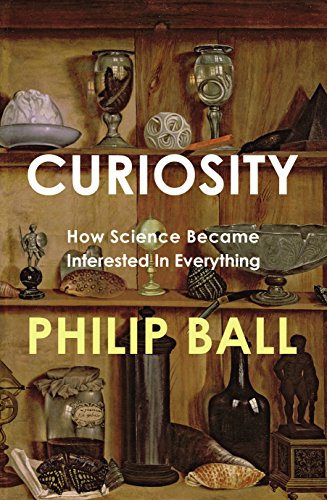Verwandte Artikel zu Curiosity: How Science Became Interested in Everything

Inhaltsangabe
There was a time when curiosity was condemned. To be curious was to delve into matters that didn't concern you - after all, the original sin stemmed from a desire for forbidden knowledge. Through curiosity our innocence was lost.
Yet this hasn't deterred us. Today we spend vast sums trying to recreate the first instants of creation in particle accelerators, out of pure desire to know. There seems now to be no question too vast or too trivial to be ruled out of bounds: Why can fleas jump so high? What is gravity? What shape are clouds? Today curiosity is no longer reviled, but celebrated.
Examining how our inquisitive impulse first became sanctioned, changing from a vice to a virtue, Curiosity begins with the age when modern science began, a time that spans the lives of Galileo and Isaac Newton. It reveals a complex story, in which the liberation – and the taming – of curiosity was linked to magic, religion, literature, travel, trade and empire.
By examining the rise of curiosity, we can ask what has become of it today: how it functions in science, how it is spun and packaged and sold, how well it is being sustained and honoured, and how the changing shape of science influences the kinds of questions it may ask.
Die Inhaltsangabe kann sich auf eine andere Ausgabe dieses Titels beziehen.
Über die Autorin bzw. den Autor
Philip Ball writes regularly in the scientific and popular media and worked for many years as an editor for physical sciences at Nature. His books cover a wide range of scientific and cultural phenomena, and include Critical Mass: How One Thing Leads To Another (winner of the 2005 Aventis Prize for Science Books), The Music Instinct, Curiosity: How Science Became Interested in Everything, Serving The Reich: The Struggle for the Soul of Science Under Hitler and Invisible: The History of the Unseen from Plato to Particle Physics.
„Über diesen Titel“ kann sich auf eine andere Ausgabe dieses Titels beziehen.
EUR 6,44 für den Versand von Vereinigtes Königreich nach USA
Versandziele, Kosten & DauerSuchergebnisse für Curiosity: How Science Became Interested in Everything
Curiosity: How Science Became Interested in Everything
Anbieter: WorldofBooks, Goring-By-Sea, WS, Vereinigtes Königreich
Paperback. Zustand: Very Good. The book has been read, but is in excellent condition. Pages are intact and not marred by notes or highlighting. The spine remains undamaged. Artikel-Nr. GOR003968095
Anzahl: 4 verfügbar
Curiosity: How Science Became Interested in Everything
Anbieter: ThriftBooks-Dallas, Dallas, TX, USA
Hardcover. Zustand: Very Good. No Jacket. Former library book; May have limited writing in cover pages. Pages are unmarked. ~ ThriftBooks: Read More, Spend Less 2. Artikel-Nr. G1847921728I4N10
Anzahl: 1 verfügbar
Curiosity : How Science Became Interested in Everything
Anbieter: Better World Books Ltd, Dunfermline, Vereinigtes Königreich
Zustand: Very Good. Ships from the UK. Former library book; may include library markings. Used book that is in excellent condition. May show signs of wear or have minor defects. Artikel-Nr. GRP95353052
Anzahl: 2 verfügbar
Curiosity : How Science Became Interested in Everything
Anbieter: Better World Books Ltd, Dunfermline, Vereinigtes Königreich
Zustand: Good. Ships from the UK. Used book that is in clean, average condition without any missing pages. Artikel-Nr. 15209660-6
Anzahl: 1 verfügbar
Curiosity : how science became interested in everything
Anbieter: MW Books, New York, NY, USA
First Edition. Fine cloth copy in a good if somewhat edge-nicked and dust-dulled dust-wrapper, now mylar-sleeved. Remains particularly well-preserved overall; tight, bright, clean and strong. Physical description: viii, 465 p. : ill. ; 24 cm. Subjects: Curiosity. Science History ; Popular works. Genre: Science. Language: English. 1 Kg. Artikel-Nr. 365797
Anzahl: 1 verfügbar
Curiosity: How Science became interested in everything
Anbieter: PEMBERLEY NATURAL HISTORY BOOKS BA, ABA, Iver, Vereinigtes Königreich
Zustand: Fine. viii, 465, text figs. . HB. Fine. . [9781847921727]. Artikel-Nr. S53660
Anzahl: 1 verfügbar
Curiosity : How Science Became Interested in Everything
Anbieter: Anytime Books, London, Vereinigtes Königreich
Soft cover. Zustand: Fine. Where has curiosity led humans? pp486. ARC. Unread. Artikel-Nr. 005779
Anzahl: 1 verfügbar

